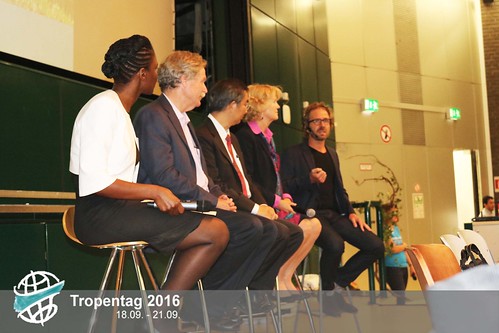Tropentag 2016
Organic markets and certification – Participatory systems but not too much romance please
Tue, 09/20/2016 - 11:23 — LangTalking about the very interesting poster presentations, Tuesday's morning session started with a much striking symposium about the future of the organic market. The content of each presentation can be found online, that is why, here, I rather want to focus on the side questions and discussions that arose during the session.
The first critical point at issue coming up was about the length of a stay for conducting a scientific study and, especially, for developing statements. The chair of the session, Prof. Christian Vogl (BOKU University), recommended that sometimes it is better to formulate hypotheses or research questions instead of concrete statements and conclusions, especially when scientists are conducting a short-term project. In fact, within a few weeks, it does not seem very realistic to get an in-depth insight of any subject.
After the first two presentations, the topics shifted towards organic markets and cooperations. Pauline Deltour presented a study from Florianópolis, SC Brasil: “Short Supply Chains of Organic Food: Socioeconomic Emancipation of Family Farmers?”, showing that agricultural fairs (i.e. weekly farmer markets) present the most emancipatory (concerning high reciprocity and autonomy) potential to farmers, but, nevertheless, they are still too small. That is why the organic farmers in the region also need shops for selling their products in order to guarantee a permanency of income.
Seeds of hope germinating: Rudolf Buehler presents the project that links farmers in Germany and Zanzibar
Tue, 09/20/2016 - 09:46 — BergerIt is late on Monday, or let´s say it feels late at least. Rudolf Bühler, Chairman of the Swabian Farmer´s Association and Marketing Organisation (BESH) in southern Germany, presented a short film introducing their collaboration with spice farmers in Kerala and Zanzibar.
BESH is well known in southern Germany as a showcase of farmers organising themselves to marketing the multiple values of their produce. BESH farmers have revived a local Swabian pig breed (Schwäbisch Hällisches Landschwein) and are successfully generating fair prices for their members.
The film “Seeds of Hope” shows how the BESH is trying to establish close links between all elements of the value chain - now also by including the direct exchange with spice producers in Kerala and Zanzibar. Rudolf Bühler started this cooperation in Kerala, India, where smallholder farmers produce local varieties of pepper, cardamom or cloves in a traditional multi-layered mixed cropping system, because he recognized how this growing system was already organic before being certified as such.
Jury on The Josef G. Knoll European Science Award 2016 Winners
Tue, 09/20/2016 - 09:26 — FadliThe Josef G. Knoll European Science Award is given every two years to the authors of the best doctoral or post-doctoral theses. As a pioneer in agricultural research, it supports young researchers whose work focuses on improving the status of food and nutrition security in developing countries and makes a contribution to reducing hunger. The winners who have been awarded this year are three in total, and have very interesting profiles:
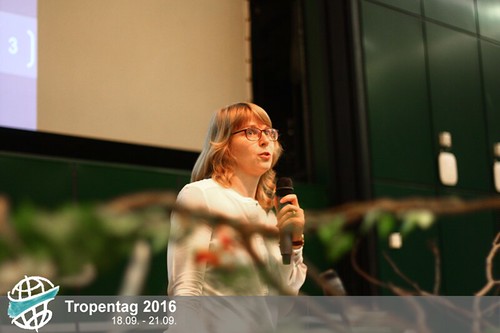
Dr. Sabine Liebenehm, from Leibniz University of Hannover, wrote a thesis on “New Insight from Behavioral Economics in Developing Countries”. “She produced an excellent work which is very important for small-scale farmers in developing country. It has direct implications regarding poverty and hunger,” announced the panel of judges.
"Why do the poor continue to stay poor?"
Tue, 09/20/2016 - 09:17 — ElsbyKeynote Discussion Round
This is arguably the most important part of any public presentation – the opportunity for the audience to engage, comment, and challenge the speakers.
The comment that really stuck out to me from the audience was an attendee from Ghana, who countered the optimism of the presenters by asking “Why do the poor continue to stay poor?”. This is obviously a tough question to try and answer, as no single person or country is responsible for this continued global injustice.
Another comment from the crowd stated that “solidarity has come a little late…but is still welcome”. This is an important reminder that there may still be some resentment circulating between the North and South concerning any possible exploitation or injustice that citizens of developing countries may have experienced.
Are young people interested in getting into agricultural studies?
Tue, 09/20/2016 - 08:36 — QuagliaProf. Folkard Asch shared with us his impression about how global problems increased the interest in development-oriented research and raised the number of young researchers in agricultural studies.
The chairman of ATSAF expects researchers to be engage in networking and showing their results during Tropentag 2016.
Organic Farming Systems: from Kenya to Cuba
Tue, 09/20/2016 - 01:18 — FadliThe first session of guided posters presentation was held on Monday, 19th September. I personally got particularly interested in the organic farming systems topic. There are six intriguing poster presentations related to current studies on organic farming. The following are the overviews of the presentations:
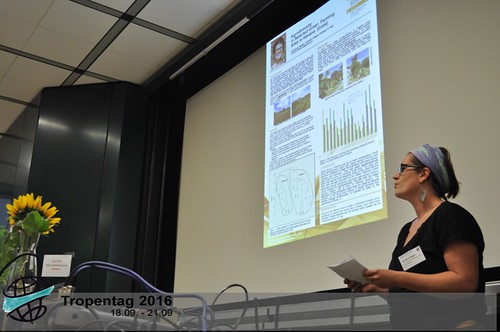
Christiane Ringler described agrobiodiversity in 15 urban gardening plots in Havanna, Cuba. She found 130 different plant species mostly as leafy vegetables, tubers, fruits and spices from 65 different families, and concluded that small urban farms might have higher species richness and evenness compared to larger gardens.
Bernhard Freyer, head of the Division of Organic Farming at BOKU and among the main organizers of Tropentag 2016, offered a stimulating lecture on growth and productivity of clover in the highlands of the Ethiopian Awi Zone. Different levels of organic treatment applied to clover, farmyard manure, fresh sesbania manure, and a combination of the two manures. As he explained, a high amount of organic manure as fertilizer has a strong impact on clover yield.
My personal highlight of Tropentag so far: Workshop 9 on Forest and Tropical Trees' Conservation
Mon, 09/19/2016 - 21:35 — PoscherBeside the great job of the presenters, two more reasons why it succeeded in my mind were:
1st. The discussions that critically analyzed the research finding and its (limited) impact on development 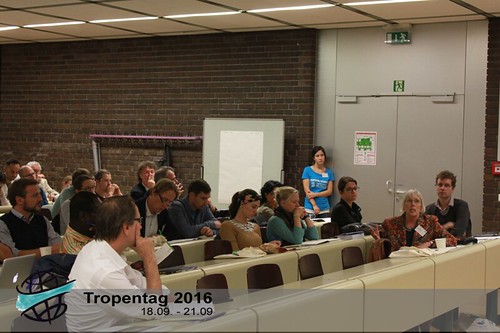
2nd. The closeness and approachability of the panel experts concearning ideas and knowledge exchange during the coffe break and afterwards.
Check the Hans H. Ruthenberg Award for Graduates 2016 Here!
Mon, 09/19/2016 - 21:12 — FadliThis year independent scientific jury finished their assessment. Three winners with excellent research theses have been selected. Thirteen applicants submitted their theses this year. In order to be reckoned, the research should fulfil requirements such as academic excellence, scientific evidence, and it should address improvement in food security. However, for next year, the jury hopes that there will be more entries from international student. Take a look at the Hans H.Ruthenberg Award for Graduate 2016 winners and their excellent works.
Mareike Aufderheide-Voigts
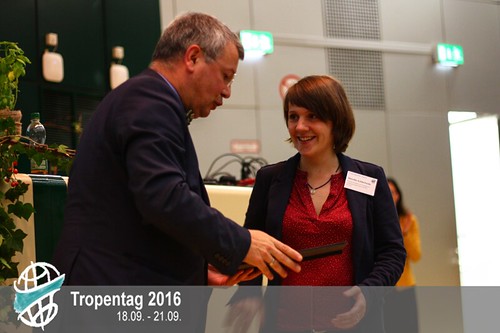
Mareike studied reproductive performance and modelled herd development of cattle kept. Borana pastoralists as dominating ethnic group in Sothern Eithiopia focus on keeping Boran cattle. During her field research, the student from Kassel-Witzenhausen University, found a different grazing system: families are split up between two grazing areas and the cattle are seasonally moved from one to the other section. In this sense, families practice an almost sedentary lifestyle, while the animals are still managed somehow as mobile. This usual procedure proved to improve food security in the region.





